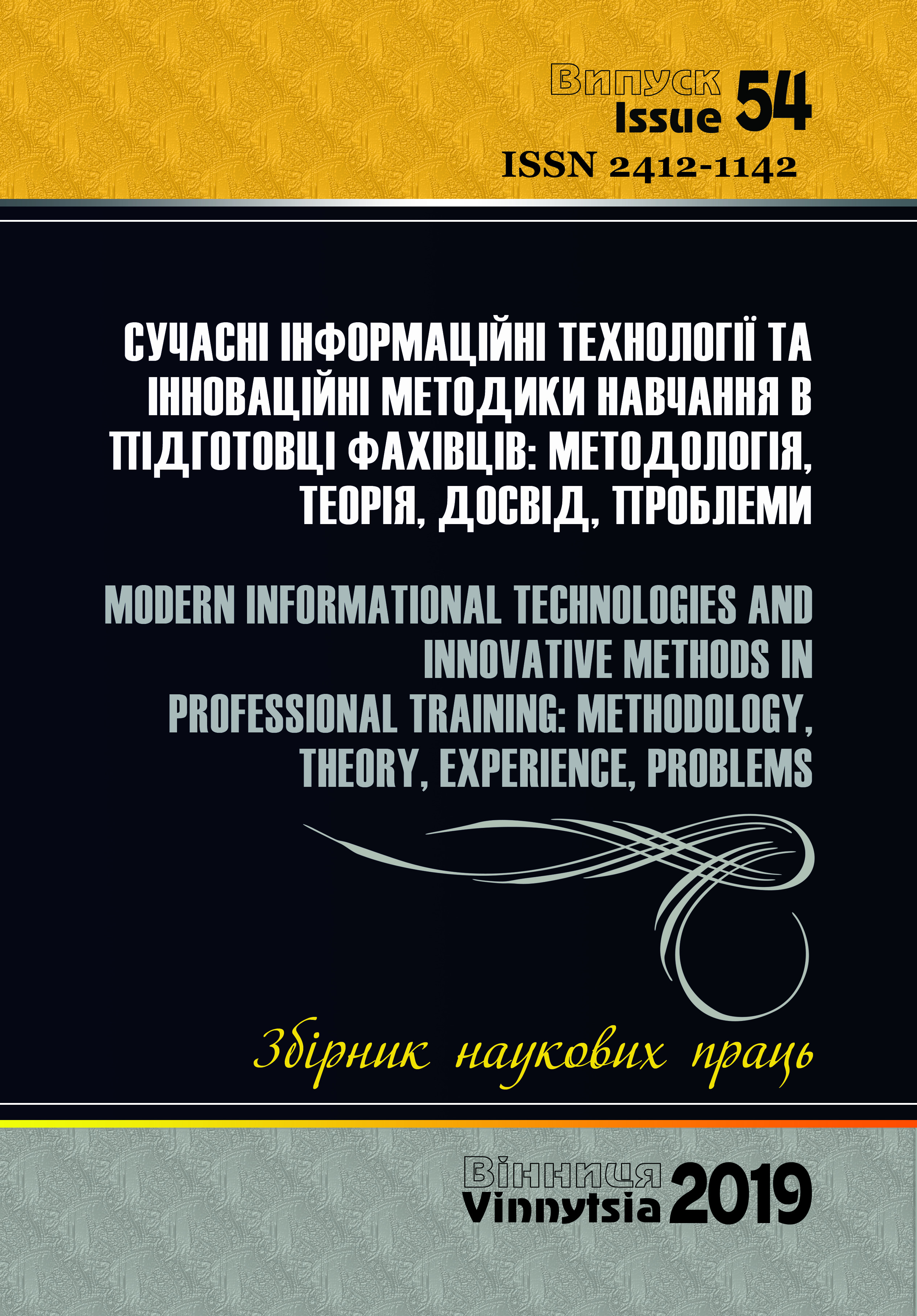DIDACTIC METHODS OF FORMING MENTAL LABOUR CULTURE OF PRIMARY SCHOOL CHILDREN
DOI:
https://doi.org/10.31652/2412-1142-2019-54-14-18Keywords:
mental labour culture, primary school children, a model of mental development, didactic methods, the methods and teaching, developing educationAbstract
This article describes basic approaches to definition of a concept primary school children’s culture
of mental labour, models of mental development which have developed in Developmental and Educational
psychology, Didactics are characterized. The basic didactic methods that stimulate cognitive interests and promote
the development of the pupils' culture of mental labour are described.
The culture of mental labour is a complex psychological and pedagogical phenomenon, a characteristic of the
human personality, which characterizes the level of development of his/her intellectual, cognitive, research and
organizational qualities, which provide rationality and high productivity of mental activity.
The culture of mental labour of primary school children reflects the positive attitude of a child to the content
and learning process, the ability to moral and volitional mobilization aimed at achieving an educational goal that
requires the individual activity. The education and development of the culture of mental labour become the basis of
the development of personality culture in general. As the indicators of the pupils` mental development are determined
differently by researchers, they develop problems of correlation between learning and development, several models of
the pupil's mental development have emerged in psychological and pedagogical science. In view of the key elements
and internal connections in these models, educators develop their own approaches to the formation of a culture of
mental labour, the vast majority of which are in line with the ideas of developing and advanced education. In the
framework of these approaches, we propose to use a number of didactic methods that stimulate the intellectual
development of primary school children and contribute to the formation of a culture of mental labour in them.
Among the main didactic methods of working with learning tools, such as models, devices, natural objects are
the following: previewing, visual analysis, visual reproduction, localization, comparison. Methods of pupils' educational
activity on the lessons that can be implemented within different teaching methods and contribute to the development
mental labour culture of primary school children, for example, tasks with a sample for reproduction; execution of
individual parts of the task; supporting questions; instructing in details; tasks with theoretical backgrounds; tasks for
developing self-control skills.
Downloads
References
В.Х. Адилова // Научно-практический журнал «Гуманизация образования» - 2016. - No 6. – С.68-73. – с. 69.
Анисимов О. С. Методологическая культура педагогической деятельности и мышления / О.С.Анисимов. М., 1991.
Гриньова В.М. Як навчатися самостійно: навч. посіб. / В.М. Гриньова, В.М. Дармограй. – Харків: Новое слово, 2006. – 120 с.
Ерастов Н.П. Культура умственного труда. Беседы о рациональной организации познавательной деятельности /
Н.П. Ерастов. – Ярославль: Верх.- Волж.кн.изд-во, 1973. – 192 с.
Зубра А.С. Культура умственного труда студента: пособие для студентов высших учебных заведений / А.С. Зубра.
— Минск: Дикта, 2006. - 228 с.
Ібрагім Ю.С. Фізіологічні основи організації розумової праці / Ю.С.Ібрагім // Педагогіка і психологія формування
творчої особистості: проблеми і пошуки: зб. наук. праць. − Київ-Запоріжжя : ЗОІППО, 2008. – Вип. 48. – С. 121 128.
Кулагина И.Ю. Младшие школьники [Текст] / И.Ю. Кулагина. – М.: Эксмо, 2009. – 176 с.
Лозова В.І. Цілісний підхід до формування пізнавальної активності школярів: навч. посіб. / В.І. Лозова. – Харків: «ОВС», 2000.– 164 с.
Холодная М.А. Психология интеллекта: Парадоксы исследования 2-ое изд, перераб. и доп. / М.А. Холодная. – СПб.: Питер, 2002. – 272 с.
Менчинская Н.А. Проблемы обучения, воспитания и психического развития ребенка : избранные психологические
труды / Н. А. Менчинская. - М.: Институт практической психологии ; Воронеж : МОДЭК, 1998. - 448 с.
Паламарчук В.Ф. Техне інтелектус / Технологія інтелектуальної діяльності учнів : посіб. для вчителів /
В.Ф. Паламарчук. – К.: АПН України, 1999. – 92 с.
Сачава К.Д. Формування культури розумової праці молодших підлітків: Електорнний ресурс // Science and Education
a New Dimension: Pedagogy and Psychology. Vol. 3, 2013. Р. – 132-135. – Р.132.
Чуприкова Н. И. Психология умственного развития: Принцип дифференциации. — М.: АО “СТОЛЕТИЕ”, 1997 —480 с.
Чуприкова Н.И. Умственное развитие и обучение : психологические основы развивающего обучения /
Н.И. Чуприкова. – Москва : Столетие, 1995. – 192 с.
Downloads
Published
Issue
Section
License
Copyright (c) 2020 М. О.Давидюк, А. І. Подуфалов

This work is licensed under a Creative Commons Attribution 4.0 International License.





